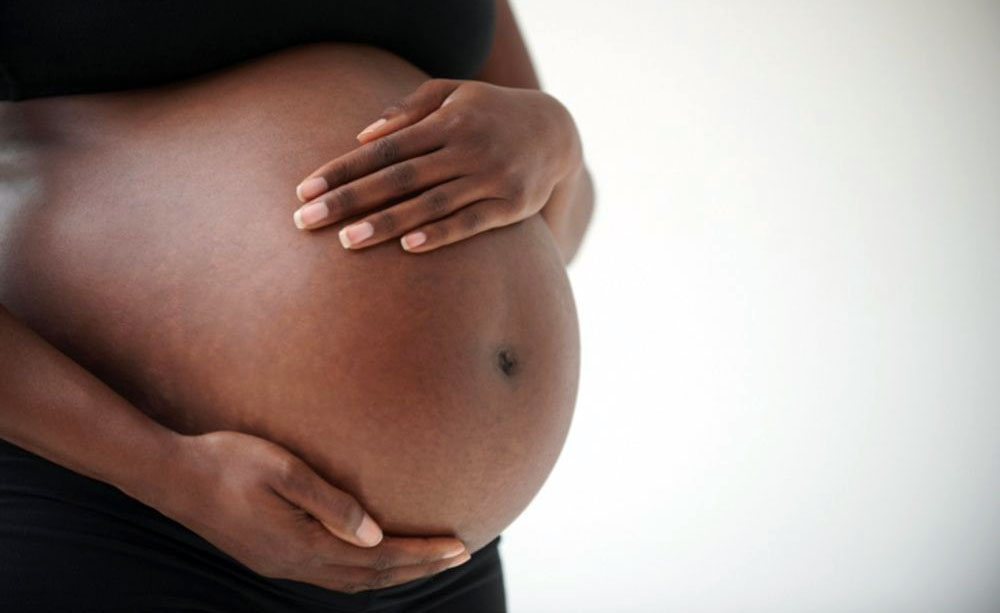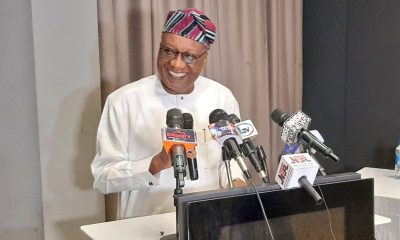metro
Killer Soldier: What Yobe Cleric Asked Me Before I Pulled The Trigger

Lance Corporal John Gabriel, a soldier with registration number N/A13/69/1522, has opened up on how he tricked Sheik Goni Aisami-Gashua, a prominent cleric in Yobe State, before killing him.
Daily Trust had reported how the cleric was shot dead after he offered lift to his killer on Friday night.
Aisami was headed for Gashua from Nguru when his killer who was in mufti pleaded to join him to Jaji-Maji.
As they proceeded on the journey, he tricked the cleric who alighted from his vehicle but never made it back again as Gabriel snuffed life out of him.
Speaking when he was paraded by the police on Wednesday, the killer soldier who was attached to 241 Recce Model Battalion, Nguru, said the Sheik asked him two questions before he pulled the trigger.
“We were approaching Jaji-Maji and the windows were wound down, so I told him (the victim) that I was hearing a sound under his vehicle and he said he was suspecting something under it and he wanted to park and check. After he parked by the roadside, he alighted and I followed him. After checking, he found out that it was not what he suspected.
READ ALSO:
- 2023: My support is for APC candidates only, says Buhari
- Lagos lawyer arraigned for trafficking 11-year-old girl
- Police arrest ‘one-chance’ gang in Lagos
- EFCC arraigns Cubana manager over $164,000 fraud
“”Meanwhile, I had removed my rifle and fixed the magazine when he was under the vehicle. When he didn’t find anything under the vehicle, I told him to check the back tyre, but as he was about doing so, I pointed my rifle at him and he asked me, ‘What did I do to you?” And I responded, you did not do anything to me. He asked further, ‘Do you want to kill me?’ And I said, ‘No I don’t want to kill you.’ So, he kept quiet and I fired a warning shot, thinking he would be scared and run away. But he didn’t run away. However as he made to enter his vehicle, I fired directly at him.”
The death of the Islamic scholar had sparked a nationwide outrage, with many demanding immediate prosecution.
In an interview with BBC Hausa Service, the National Chairman of Islamic propagation group, Izala Movement, Sheikh Abdullahi Bala Lau, had said the manner in which he was murdered showed its terrorism against the Muslim Ummah.
“We condemn the assassination and we call on the Federal Government to quickly prosecute the assassins; let’s probe the motive of the killing. If it had happened that a Muslim killed a pastor, the story would have been different, we won’t let this go, we won’t keep quiet anymore,” he had said.
metro
Bauchi man arrested for impregnating 17-year-old daughter

Bauchi man arrested for impregnating 17-year-old daughter
Operatives of the Bauchi Police Command have arrested one Umar Sule for allegedly having forceful carnal knowledge of his biological daughter, leading to her pregnancy.
This was disclosed by the command’s Police Public Relations Officer, Ahmed Wakil, in a press release issued on Friday.
Wakil said, “On April 3, 2025 at about 16:30hrs, the command received a complaint from one Abdullahi Baban Karatu aged 55 years of Kurmin Ado village via Kariya ward, Ganjuwa LG, Bauchi State, through Ganjuwa Divisional headquarters against one Sule aged 54 years of the same address.
“It was alleged that sometime in the month of November 2024 at about 21:00hrs, he premeditatedly had sexual intercourse with his biological daughter (named withheld), aged 17 years, in his matrimonial bedroom on different occasions.
READ ALSO:
- Rivers emergency rule: NBA moves annual conference from PH to Enugu
- US envoy meets Tinubu in Paris over economic war
- 13 major Lagos markets shut down over waste violations
“Upon receipt of the report, a team of certified season detectives was assigned to conduct a discreet investigation and arrest the accused.”
The PPRO revealed that during interrogation, the suspect, willingly admitted his wrongdoing and added that he had been molesting her several times on different occasions, which led to her pregnancy for three months, according to an examination report obtained from a medical practitioner.
He added that, “While interviewing the victim, she corroborated the suspect’s statements, adding that the incident happened when her mother travelled to visit her parents at Burra village via Ningi LGA, Bauchi state, which her father took advantage of and was having sexual intercourse with her.
“Thereafter, on the return of her mother, she observed the victim was pregnant and questioned her who was responsible. The victim disclosed that it was her biological father.”
The statement added that the state Commissioner of Police, Sani-Omolori Aliyu, has directed that the case be charged to court after the investigation is completed.
Bauchi man arrested for impregnating 17-year-old daughter
metro
Rivers emergency rule: NBA moves annual conference from PH to Enugu

Rivers emergency rule: NBA moves annual conference from PH to Enugu
The Nigerian Bar Association (NBA) has announced the relocation of its 2025 Annual General Conference from Port Harcourt, Rivers State, to Enugu, citing the federal government’s imposition of emergency rule in Rivers as unconstitutional.
The decision, made official in a statement issued late Thursday and jointly signed by NBA President Afam Osigwe (SAN), General Secretary Mobolaji Ojibara, and Chairman of the Annual General Conference Planning Committee (AGCPC) Emeka Obegolu (SAN), reflects mounting concerns over governance in the state.
According to the statement, the appointment of a retired military officer as Sole Administrator has disrupted preparations for the conference and cast doubts on the city’s suitability as host.
“The announcement that Port Harcourt, the Garden City, would host the 2025 Annual General Conference (AGC) of our Association was met with widespread enthusiasm. Indeed, prior to the declaration of a state of emergency in Rivers State on March 18, 2025, registration figures had soared, reflecting the excitement and eagerness of members to attend. However, the unfortunate turn of events in Rivers State has understandably stalled the momentum and affected advanced preparations for the Conference.
“Currently, Rivers State is being governed by a retired military officer, appointed as a Sole Administrator, who operates with a command-style approach that disregards constitutional provisions, court decisions, and pending litigation. His actions have undermined democratic institutions and processes, flouting the rule of law with impunity. Though clad in civilian attire, he governs as though the state is under military rule.”
READ ALSO:
- US envoy meets Tinubu in Paris over economic war
- 13 major Lagos markets shut down over waste violations
- Mohamed Salah pens new two-year deal at Liverpool
Following growing calls from members for a change of venue, the NBA leadership engaged with its branches in Rivers and convened an emergency National Executive Council (NEC) meeting on March 27.
“The voices of our members, particularly those calling for a change of venue, grew stronger over time. We convened meetings with the Chairmen of NBA branches in Rivers State and held an emergency session of the National Executive Council (NEC) on the 27th of March, 2025. The overwhelming consensus was that the NBA could not, in good conscience, proceed with the AGC in a state governed unconstitutionally by a Sole Administrator.”
The NEC further criticized the state of emergency, arguing it contravenes constitutional guidelines and questioning its approval by the National Assembly.
“The NEC reaffirmed that the state of emergency declared in Rivers State violates Section 305 of the 1999 Constitution. It further noted that the suspension of elected officials and democratic institutions contravenes Sections 11 and 188 of the Constitution. The purported ratification by the National Assembly, executed via voice vote rather than the constitutionally required two-thirds majority amounts to a grave constitutional subversion. Even if the proper procedure had been followed, it would not legitimize an unconstitutional proclamation,” the NBA said.
Maintaining its stance on the rule of law, the association said hosting the conference under the current conditions would be inconsistent with its values.
The event will now take place in Enugu, chosen for its readiness and alignment with constitutional principles.
“The NBA has taken a principled position in accordance with the law: the appointment of a Sole Administrator in Rivers State is unconstitutional. Consequently, and in alignment with the overwhelming position of NEC and the broader membership, we are compelled to relocate the 2025 AGC to a state where constitutional democracy remains intact.
“We are pleased to announce that the 2025 Annual General Conference will now be held in the historic Coal City of Enugu. The city possesses the infrastructure and capacity to host a conference of our scale and significance. We are confident that, with concerted efforts, this change of venue will not compromise our commitment to delivering a successful and impactful Conference.
“We call on all members and stakeholders to lend their full support as we embark on this new path. With unity, diligence, and a shared commitment to our values, we will make this transition a resounding success.”
Rivers emergency rule: NBA moves annual conference from PH to Enugu
metro
13 major Lagos markets shut down over waste violations

13 major Lagos markets shut down over waste violations
In a sweeping enforcement move, the Lagos State Government has closed 13 markets across the state due to ongoing environmental infractions, particularly the indiscriminate dumping of refuse on streets, road medians, and highways—a breach of the Lagos State Environmental Management and Protection Law of 2017.
The Commissioner for Environment and Water Resources, Tokunbo Wahab, made this known via a post on his X (formerly Twitter) account, revealing that the closures were carried out on Thursday night.
“In line with our commitment to environmental sanity, Ketu and Mile 12 markets were successfully sealed last night for persistent violations, including illegal waste disposal on roads, medians, and highways – contrary to the Lagos State Environmental Management and Protection Law of 2017,” Wahab stated.
“These enforcement actions are necessary to safeguard public health and restore order to our public spaces. Market stakeholders must take responsibility for proper waste management going forward.
READ ALSO:
- Mohamed Salah pens new two-year deal at Liverpool
- Court orders FG to take over 7 properties of ex-FBN personnel
- FG announces new guidelines for appointing VCs, rectors, provosts
“Let us work together to build a cleaner, safer, and more responsible Lagos,” he added.
Markets affected by the clampdown include Erukan Market in Mile 12, Oja Oba in Ketu, Owoseni Tundas Market, and Oba Ogunjobi Market—locations long associated with poor sanitation practices.
The action also impacted various commercial spaces: shops at the Mile 12 BRT Terminal, Mile 12 Bus Stop outlets, and the Ketu Terminal Market, which houses six plazas. Other sealed locations include Ifesowapo Shop Owners Market in Mile 12, Demurin Street Plaza Shops in Ketu, and a business premise at 6 Demurin Road.
Further closures extended to Ifelodun Market in Ketu, the Ibadan Unit 1 Park near Babajide Sanwo-Olu Market and Ikosi Fruit Market, as well as the Ketu Tipper Garage.
The government emphasized that the initiative aims to reinforce environmental discipline and improve living conditions in the bustling metropolis.
13 major Lagos markets shut down over waste violations
-

 metro1 day ago
metro1 day agoWhy Obi’s 15-year-old supporter is in prison — Lawyer
-

 metro2 days ago
metro2 days agoNigerian woman admires polygamy, seeks co-wife for husband
-

 Education1 day ago
Education1 day agoEasiest way to pass UTME, by JAMB registrar Oloyede
-

 metro1 day ago
metro1 day agoINEC names Sam Olumekun as acting chairman
-

 metro3 days ago
metro3 days agoNational grid: FG officially splits TCN, inaugurates NISO
-

 Sports3 days ago
Sports3 days agoChampions League: Arsenal stun Real Madrid 3-0 as Rice delivers free-kick masterclass
-

 News3 days ago
News3 days agoAli Baba spills what Obasanjo told him on how to become Nigeria’s President
-

 International3 days ago
International3 days agoI don’t want wahala, I’m not cheating again – Davido





